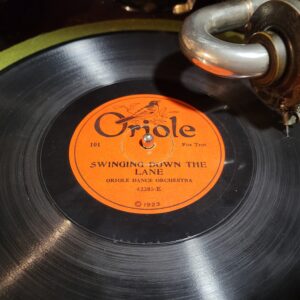Table of Contents
There’s a certain magic to the crackle and pop of a vintage record. That nostalgia often leads us down a rabbit hole of discovery – the stories behind the songs and the labels that made them possible. In this “Record Label of the Week” feature, we’re exploring Oriole Records: a budget label that, despite its humble beginnings, left its mark on the vibrant musical landscape of the 1920s. Oriole played a key role in bringing the joy of recorded music to everyday households, offering a window into the sounds that shaped a generation. Get ready to delve into the fascinating tale of Oriole Records!

Oriole Records wasn’t born in a fancy recording studio or the headquarters of an entertainment giant. Its story began in 1921 within the aisles of McCrory’s stores, a popular chain of five-and-dime shops across the United States. Seeking to expand their offerings, McCrory’s saw an opportunity in the growing popularity of recorded music, and Oriole Records was created as their in-house label to provide affordable records directly to their customers.
Initially, Oriole partnered with the Cameo Record Company to press their records. These early releases stood out with their bright orange labels and the bold declaration of their bargain price – a mere 25 cents per disc. While major record labels focused on the latest hits and renowned artists, Oriole relied on a different strategy. They leased masters from other labels, often smaller or regional ones, allowing them to offer a diverse selection of music without the overhead costs of original recordings.
Oriole’s budget-friendly approach didn’t translate to a limited musical selection. Their catalog boasted a surprising breadth of genres, reflecting the rich tapestry of American music in the 1920s. From the infectious rhythms of jazz and the soulful sounds of blues to the foot-stomping energy of country and the catchy melodies of popular tunes, Oriole offered something for everyone.
While major labels often focused on promoting specific artists, Oriole’s focus lay on the music itself. This democratic approach meant that alongside established stars, listeners might discover the work of lesser-known, but equally talented, musicians. This focus on variety not only satiated the musical appetites of a wide audience but also played a crucial role in preserving a broader spectrum of the era’s musical landscape. Through Oriole’s affordable records, these diverse sounds found their way into living rooms across the country, fostering a love for music that transcended genre and popularity.
Oriole Records thrived in the Roaring Twenties, but the winds of change were on the horizon. The Great Depression loomed large, casting a shadow over American prosperity. As the nation grappled with economic hardship, budget labels like Oriole faced an uphill battle. Consumers, with less disposable income, became increasingly selective about their purchases.
Furthermore, the rise of radio fundamentally altered the way people consumed music. Entertainment was now readily available for free within the homes of millions of Americans. Radio broadcasts catered to the growing demand for specific hit songs and popular artists. This shift in preferences dealt a blow to labels like Oriole, which relied on offering a diverse catalog rather than pushing star musicians. Under the pressures of economic turmoil and changing tastes, Oriole, along with many other budget labels, was acquired by the American Record Corporation in the early 1930s.
While Oriole Records might have faded from the scene, its legacy endures. The label’s commitment to accessibility played a pivotal role in democratizing recorded music during its heyday. Through their budget-friendly approach, Oriole helped bring music into countless homes where it otherwise might not have been affordable. Their diverse catalog serves as a time capsule, showcasing not only the popular hits of the 1920s, but also the often less-celebrated yet integral sounds of the era.
Beyond its historical importance, the story of Oriole Records resonates with today’s music enthusiasts. The thrill of discovering a vintage record, the charm of its nostalgic crackles, and the quest to uncover its hidden stories – all of this speaks to the enduring power of music preservation. Oriole reminds us that even labels born from humble circumstances can leave a lasting mark on the vast musical landscape.
The tale of Oriole Records is a microcosm of the larger narrative of American music history. It’s a story of innovation, shifting trends, and the enduring desire to share and preserve the sounds that shape our lives. If you happen to come across a dusty Oriole record, take a moment, spin it on a turntable, and let yourself be transported back to a time when music found its way into homes through an unlikely alliance between a five-and-dime store and a determined record label.
(*Swinging Down the Lane*, by the Oriole Dance Orchestra, 1923)
